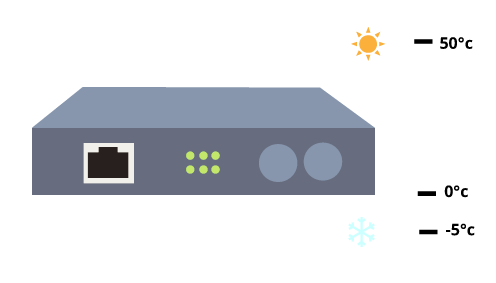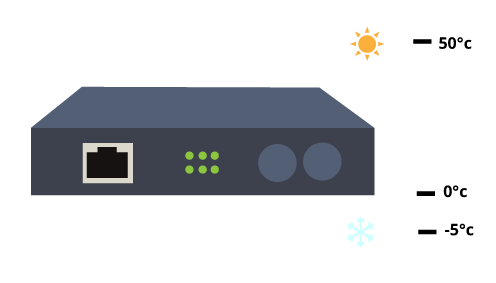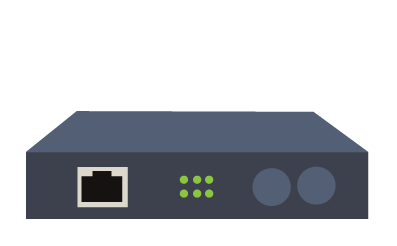Why Use an
Industrial Media Converter ?
EtherWAN's media converters are required to pass real-time data transfer test under -40°C to 85°C for 72 hours.
I have some questions about commercial vs industrial media converters.

OK, what kind of questions?

What are the differences between the two, and when should I choose an industrial media converter instead of a commercial one?

Well, the main difference is the environment in which they are going to be used. and the main environmental factor is temperature.
A commercial media converter will have an operating temperature range of about 0 to 50°C (32 to 122°F), while an industrial media converter’s range is much wider, like -10 to 60°C (14 to 140°F).
Some hardened versions can even operate in a massive temperature range of -40 to 75°C (-40 to 167°F).

commercial media converter

industrial media converter

Besides operating temperature,
what are the other differences between commercial and industrial models?
what are the other differences between commercial and industrial models?

On the environmental side, industrial media converters often have higher MTBF than commercial ones, especially for critical or complex assets. The higher the MTBF, the longer a system is likely to work before failing.
On many industrial models, there are also protections against electromagnetic interference (EMI) and/or radio-frequency interference (RFI). these protections will vary, with some media converters being designed for very specific applications.

On many industrial models, there are also protections against electromagnetic interference (EMI) and/or radio-frequency interference (RFI). these protections will vary, with some media converters being designed for very specific applications.



When should I choose a media converter instead an Ethernet switch?

For example, network switches are equipped with copper and/or fiber ports. However, sometimes you don't have enough fiber ports to connect all your end devices. For example, when the distance to the end devices is more than 100 meters.
You could use one fixed fiber switch with multi-mode transmission, or use a copper switch together with industrial media converters that have different speed and distance settings.
Comparing the two approaches, maximum flexibility can be achieved using a switch with media converters. This allows for greater future expansion possibilities and is often more cost effective. 
You could use one fixed fiber switch with multi-mode transmission, or use a copper switch together with industrial media converters that have different speed and distance settings.
Comparing the two approaches, maximum flexibility can be achieved using a switch with media converters. This allows for greater future expansion possibilities and is often more cost effective.
$
▼
$
▼
$
▼
$
▼
$
▼


Can you give some examples of these industrial applications?

There are quite a few: security and surveillance, wastewater treatment plants, urban traffic control systems, building automation, and factory automation.







